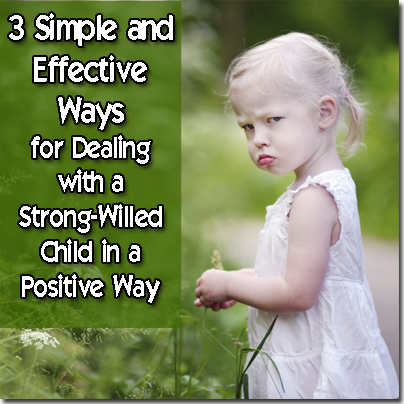 What’s wrong with you?
What’s wrong with you?
Why are you so naughty?
Why can’t you be more like your sister? The neighbor? A “normal” kid?
If you’re raising a strong-willed child, you’ve most likely asked questions like these, or have watched as your child was being asked these questions by other family members or teachers.
As a parent myself and a play therapist who works with families struggling with their children’s behaviors, I’ve come to learn over the years that parenting in general is a hard job, even when you have an easy-going child. The role of parenting might lead you to say or do some things that you instantly regret, that plague you with guilt day after day.
But dealing with a strong-willed child? That’s an experience that only a small portion of parents get the luxury of experiencing, and if you’re reading this, it means that you’ve very likely won that lottery.
And that you know parenting this child brings a level of emotional and intellectual exhaustion that the typical parent cannot even comprehend (and never truly will).
And even though you’ve been told that having a strong-willed child can be a great thing long-term, there’s something about the negativity that can come from constantly getting pushback from your child that makes you question whether the “experts” who purport the good side of raising strong-willed children even know what they’re talking about.
How can it be such a good thing if all we ever do is argue?
If our entire relationship has a cloud of negativity, conflict and anger, what part of this is going to lead to a good future… for my child or for our relationship?
Sometimes I don’t even want to be in the same room as her… and she’s still a little girl. How on earth is this going to end up being a good thing for her when she’s a teenager? An adult? A spouse? An employee?
When Dealing with a Strong-Willed Child Becomes Overwhelmingly Negative
 Dealing with a strong-willed child typically makes you feel like every aspect of your parenting role is filled with negativity, from the seemingly never-ending power struggles and arguments with your child, to the way others speak about your child or the advice they give for how you could parent better if you just did it their way (even though they’ve never raised a strong-willed child).
Dealing with a strong-willed child typically makes you feel like every aspect of your parenting role is filled with negativity, from the seemingly never-ending power struggles and arguments with your child, to the way others speak about your child or the advice they give for how you could parent better if you just did it their way (even though they’ve never raised a strong-willed child).
When parenting a strong-willed child is at its most difficult, it’s a reality that your life is shrouded in negativity; it can seem like there’s no way out, and most days it feels like things are going to keep getting worse as your child gets older.
In my work as a play therapist with strong-willed children and their parents, I’ve heard dejected statements from parents—who love their kids and wouldn’t trade them for the world—but who are grieving the loss of the parenting role they once dreamed they’d have.
Parents bring their children in to see me because they’ve:
- Tried to connect with their strong-willed child but continuously feel shut out, or worse, attacked
- Attempted to help their strong-willed child to become a better student, friend or sibling, but their lessons are going nowhere and just causing more tension in all of these settings and relationships
- Felt concerned that if something isn’t done about this behavior now, their child’s chance for a positive and enjoyable future is in jeopardy
My job as a play therapist is to help parents to learn how to better understand their strong-willed child so that they can find alternative ways of guiding their child’s behavior, and to help the child to learn how to be a more cooperative and connected child with family, friends and teachers.
When I begin my therapy relationship with families, I often see the worn-down faces of parents who have accepted that the constant power struggles, arguments and competition are now a way of life.
But do you know what else I’ve seen?
Over time, I’ve seen those worn-down faces become more bright and optimistic as they share their successes with me after they’ve learned new ways of interacting with their strong-willed child that bring about real change — for their child’s behaviors and for their relationship with their child.
I’ve heard those hopeless statements turn into hopeful wishes for their child’s future, now that they’ve learned how to better guide their strong-willed child into a way of using his strong will positively in the world.
And perhaps the best I’ve seen is the pride felt by both the parents and strong-willed children I work with when they realize that the rest of the world doesn’t view them so negatively anymore. And that they — strong-willed temperament and all — can provide real value to the world around them!
With just a few simple changes, it is possible to climb out of that shroud of negativity — both at home and in public — and into a more positive way of viewing your child’s behaviors, your relationship with your strong-willed child and what she has to offer to the world.
Today, I’m sharing three of those simple changes with you, to help you transform that negativity and frustration that dominates your day into hope for a better future for you and your strong-willed child.
#1 Increase Positive Interactions
 As you read this subject header, you’re probably thinking:
As you read this subject header, you’re probably thinking:
So the first step to making things less negative in my relationship with my strong-willed child is to just make them positive? Have you ever met a strong-willed child? It’s not that simple!
And you’re right, changing a dynamic like this is like telling someone to “just lose weight” when they tell you they’re struggling to fit in their old clothes. This is a huge change that can’t take place with a snap of a finger.
You can’t just change negative interactions into positive ones. And part of what makes your interactions with your strong-willed child so negative is your role as his parent.
- It’s your job to set rules and limits.
- Sometimes you have to say “no.”
- Sometimes you have to make him do things he doesn’t want to do.
And when that’s your role and you’re dealing with a strong-willed child, the negativity can keep building.
But what if we focused less on how to change negative interactions into positive ones (which might compromise your role as a parent) and instead focused on how to create more opportunities for positive interactions?
If you’ve read my articles before, you’ve likely heard me say that 80% of the words we say to kids are commands:
Eat your food!
Hurry up!
Get your homework done!
Put down your phone!
When you’re dealing with strong-willed kids, those commands are a breeding ground for pushback. They don’t want to be told what to do, and if 80% of what you say to them is telling them what to do, then you’re fighting a losing battle.
The key to switching from those negativity-filled interactions to more positive ones is to switch the way in which you communicate with your child.
By using my Narrator Technique (which I’ve discussed in more detail here), you can create an experience in which there is no chance for negativity. You shift your communication from 80% commands to 100% empathy and understanding (at least in those moments when you’re using the technique). And when your kid feels heard and understood, you’ll be shocked at what that does for his attitude and your relationship with him.
This makes him feel less attacked by you. He doesn’t feel like the bad kid. He finally realizes that you get him and accept him for who he really is, and that leads to a much better relationship between the two of you.
 This makes you feel like you have a more cooperative kid on your hands.
This makes you feel like you have a more cooperative kid on your hands.
And whether it’s right or wrong, this helps to stop the judgements from others who view your child and your parenting in such a negative light.
What’s even better is that the conversation that takes place as part of The Narrator Technique can lead to lasting changes in your child’s behaviors that you’ve previously tried for days, weeks or even years to correct with no success.
The parent who has desperately tried to teach their strong-willed child to be less selfish and to understand the concept of sharing (to no avail) will find that The Narrator Technique opens a door to talk about this in a non-confrontational way.
Here’s an example of how this opportunity can develop, naturally and without a power-struggle:
Camden: I’m going to use this color, and you don’t touch any of them. This is my art project.
Dad: Oh, so you’re going to make an art project, and I’ll just sit here and watch you.
Camden: Yeah…you can just watch me.
Dad: Okay…I’m just supposed to sit and watch you do something while I do nothing.
Camden: Well, you don’t have to do nothing. You can get the colors that I ask for.
Dad: So I’ll sit here and give you the colors you ask for while you work on your art project. Then I’ll just wait until you tell me that you need another color, and then I’ll get that for you, and then I’ll do nothing in between.
Camden: Okay, so if you’re bored, I guess you can color…but you have to help me find the colors I want when I ask for them.
Dad: So I’ll color and make an art project with you, and then I’ll help you if you need help finding a color.
Camden: Yeah.
Dad: (while coloring and following the directions given to him) So, you realized that I’d be doing nothing and knew that this could be boring, so you decided that it’s okay to let me take a turn too so that I’m not bored…
We’re both having fun coloring together. I’m coloring and having fun with you, and you’re still able to do the project you wanted, even though I’m coloring instead of just watching you.
Camden: Yeah, we can both color at the same time, and it’s still fun.
Since you have to read this and cannot hear a recording of it, I find it important to note that the tone of this example is conversational. There is no sarcasm, criticism or any other negative interaction. Camden’s dad is simply narrating and summarizing what he has seen.
Many parents will return to my office and tell me that the technique doesn’t work. When I ask them to give me an example of how they used it, I typically hear something like this:
Well, I told him that he was being mean, selfish and hurting my feelings. I narrated that he wanted to ruin my day and that was selfish of him. The technique didn’t work; he just got mad at me.
Yes, your child is going to get mad at you if you’re critical or ask lots of questions to force a lesson he’s not ready to experience yet. It’s best to make sure that The Narrator Technique is used in a way that summarizes without snarky or sarcastic tones.
Here are a few examples of how not to use the technique, followed up with a better way of “narrating.” Let’s use the example of playing a game with your child:
Example 1:
Child: I don’t want to play this game. It’s stupid!
Parent [ineffective use of the technique]: You’re giving up because you’re losing, and now you think it’s the game’s fault, when really it’s all because you can’t handle losing. I don’t want to play with you if you act that way.
Parent [effective use of the technique]: You’re feeling frustrated because you’re losing, and that makes you think that the game is stupid. You would like to stop playing because of how frustrated you feel.
Example 2:
Child: (crying while playing Candy Land because she has received the Peppermint and has to go backward) That was on the line. I’m spinning again.
Parent: You think that it’s on the line when really it’s on the Peppermint.
Child: I’m not going back…I’m winning.
Parent [ineffective use of the technique]: You’re so sad that you have to go backward that you’re willing to cheat just so that you can win. I should be crying, not you, because that’s rude when you try to cheat to win. I don’t want to play with you when you act like that.
Parent [effective use of the technique]: You’re so sad that you have to go backward. You’re worried that if you play by the rules and go back to the Peppermint, then I’m going to beat you.
If you need help implementing this technique correctly, you can reach out to me here for more guidance.
#2 Give Second Chances
 In my career, I frequently see adults apply a double standard when it comes to their kids’ behavior. Unfortunately, we often have higher expectations for our kids than we do for ourselves.
In my career, I frequently see adults apply a double standard when it comes to their kids’ behavior. Unfortunately, we often have higher expectations for our kids than we do for ourselves.
- The parent who admits to calling in sick this week because of a new movie release is frantically calling me to question why her kid is lying to get out of class at school.
- The parent who gets angry and throws things scolds his child for throwing a temper tantrum and says, “You know better than that!”
- The parent who zones out on her phone and ignores her children’s requests for help is insistent that her children give up the iPad on the first request.
No one is perfect, children especially. Children are learning and growing, and it’s only through those behavioral mistakes that they truly learn how life works. But if we demand perfection — expect them to get it right the first time, every time, even though we’re not capable of doing that ourselves — we rob them of the chance to learn.
This is true of all kids, but especially for strong-willed kids.
When a potential power-struggle starts brewing between a parent and child in my office, the way the adult reacts at the start of the incident is a key indicator in whether this power-struggle will become full-blown, with everyone fuming and retreating in opposite directions, or whether the incident will instead lead to a learning opportunity for growth.
When a strong-willed child makes a mistake, the absolute worst thing that you can do is to call her out on it.
She feels cornered and attacked by the act of being called out; and she instinctively retaliates… immediately.
It’s for this reason that strong-willed kids are often seen as controlling, manipulative and stubborn. Adults see the child’s reaction to correction and negatively judge her for her emotions, instead of seeing them for what they really are: hurt feelings.
When a parent sees their child make a mistake, the first instinct might be to correct that mistake. But with a strong-willed child, that correction can quickly turn into hurt feelings, and until the child knows how to handle those hurt feelings (because she will have to learn how to handle them at some point), the initial reaction is going to be a fight.
Arguing…
Defensiveness…
And in really difficult situations, reactions like hurtful words or even outright aggression.
But when a parent sees their child’s mistake and recognizes the emotions that might come with a knee-jerk reaction and correction, they can react in a way that leads the child to experience fewer hurt feelings and make a learning opportunity out of it.
Replace Punishment with a Chance for a Better Choice
 Instead of berating a child for an inappropriate behavior, try calling attention to it and offering a chance for correction, like this: “I can see by the look on your face that you regret what you just did. Would you like a second chance to make a better choice?”
Instead of berating a child for an inappropriate behavior, try calling attention to it and offering a chance for correction, like this: “I can see by the look on your face that you regret what you just did. Would you like a second chance to make a better choice?”
This type of reaction acknowledges that your child has just made a mistake — a mistake, something we all do every single day — and gives them an opportunity for correction.
It isn’t threatening.
It isn’t embarrassing.
And it leads to much more change than scolding and punishing ever can for a strong-willed child.
I know, I know… I’m going to get some comments about how parents these days are too soft on their kids, how kids need to toughen up and parents need to stop coddling them. But before you jump to that conclusion, consider these questions:
- How do you feel if your spouse or boss or friend calls you out on a mistake in public? Does it feel good? Does it make you feel empowered to make a change? Most likely it just makes you feel embarrassed and resentful of the person who put you in that position, when instead they could have had a private, respectful conversation with you about the topic.
- How often do you do exactly what your boss asks you to do immediately? How often do you comply with your spouse’s requests or demands immediately, without hesitation? The answer to this question is likely “almost never.” If we, as experienced adults, can’t comply immediately with the demands of others, why do we expect kids to do it for us?
If there’s one thing I know about strong-willed kids, it’s that they rarely feel respected. I know this because they tell me. They tell me how they feel attacked, criticized and constantly compared to others who are “better” than they are.
When they feel disrespected, they feel the need to fight. But when they feel respected, they naturally start showing that same respect back to you.
And if you really feel the need to correct instead of just giving a second chance, you can combine second chances with The Narrator Technique to help her to learn from that second chance you gave her to transition from a poor choice to a much better one.
Here’s what that might look like:
Mom: (talking to her friend) Henry is pretty excited for Sunday.
Henry: (scowl on his face, starts to push mom while he grunts at her, repeatedly)
Mom: I can tell by the look on your face that me talking about you is embarrassing you. You’d like me to stop talking about you. Would you like to try again to tell me that in a different way?
Henry: Can you stop talking about me, please?
Mom: Thank you. You were feeling embarrassed that I was talking about you right in front of you. And when you say, “Can you stop talking about me, please?” I know that you want me to stop, and I can respect your request.
Over time, with repeated events like this, you will see your child transform from an almost constant power-struggler to someone who can accept a correction or a direction without much of a fight, because he has learned that this one mistake does not define him.
And if you’ve combined it with The Narrator Technique, he’s learned better ways for handling these mistakes in the future. Dealing with a strong-willed child just got a little easier–for both of you.
#3 Be the Voice of Change
 Parenting a strong-willed child is both emotionally and intellectually exhausting. You need an opportunity to vent to your friends and family about the difficult job you face each and every day. But while you feel the need to vent and receive support, you might also notice that you become very defensive of your child if anyone uses language that insinuates something negative about her.
Parenting a strong-willed child is both emotionally and intellectually exhausting. You need an opportunity to vent to your friends and family about the difficult job you face each and every day. But while you feel the need to vent and receive support, you might also notice that you become very defensive of your child if anyone uses language that insinuates something negative about her.
Sure, it’s difficult to parent her, but she’s your baby!
You may be wondering if there’s anything you can do to still give yourself an opportunity to get the support you need while not accidentally contributing to this negative mindset that strong-willed kids are naughty, manipulative or controlling.
There is a simple way of talking to others about your strong-willed child that can validate your stressful experience as a parent while also helping others to see your child in not-so-negative ways. It can shift everyone’s mindset from “this child is such a problem” to “this child is experiencing a problem and just needs some help to get through it.”
This technique, which I call The Reframe Technique, is based on the psychological concept of reframing, in which the person shifts their way of looking at or understanding a situation, moving from a pessimistic mindset to a more productive one.
As it relates to strong-willed children, The Reframe Technique looks like this:
Teacher: She’s so manipulative… She always wants to be in control. She needs to realize that this just isn’t possible.
Emily: Like all of us, she wants to have some control over her life. But her attempts to get that control come out in manipulative ways. You’d like for her to find more appropriate ways of trying to take control of her day.
Teacher: (initially shocked by my approach, takes a moment to think) Yeah, she’s trying to boss everyone around and tell them what to do… which I guess she only gets to do if she’s the teacher, huh?
Emily: (laughing) She wants to have as much control over the class as you do. But since she can’t do that for another 15 years or so, she has to find a better way.
Teacher: Yeah, so I guess we don’t really need to tell her to stop trying to control things, just to figure out a better way to find control that doesn’t make being a student and friend such a challenge for her.
Emily: Exactly!
Here’s another example:
Grandpa: He’s so mean unless he gets his own way.
Mom: He likes to have things go his way and when they don’t, he has a tendency to take it out on people in mean ways.
Grandpa: No one wants to play with him, and I don’t blame them. He needs to realize that he has to let others have their way too, or he’s never going to have any friends.
Mom: He’s just like me… he really wants to be in control. But unlike me, he hasn’t learned yet how this affects others. He needs help learning how to respect others’ wishes too so that he can be a better friend.
Grandpa: Unlike you? (winking)
Mom: (laughing) Okay, so maybe we both could stand to learn a little more about how our need for control affects others. We can work on that together!
Grandpa: (smiling) Well, I know where you both get it from, so maybe the three of us can work on it together!
Removing the Stigma from the Phrase “Strong-Willed Child”
 Over time, the phrase “strong-willed child” has gradually come to be associated with negativity. It’s a phrase that has inadvertently come to mean “naughty” or “manipulative” or “controlling.”
Over time, the phrase “strong-willed child” has gradually come to be associated with negativity. It’s a phrase that has inadvertently come to mean “naughty” or “manipulative” or “controlling.”
But we now know that with a slight shift in the way we interact with a strong-willed child or those who criticize strong-willed children and the parents who raise them, we can remove the negativity from the phrase. Then we can start to understand strong-willed children in a way that respects who they are and what they need to thrive in life, creating better outcomes for all of us.
The 2-Minute Action Plan for Fine Parents
To transform negativity into productivity, both in interactions with your child and those who contribute to the stigma of the strong-willed child:
- Consider whether The Narrator Technique will help you to have less conflicted conversations with your child. Are you focusing too much on correcting your child’s misbehavior when using The Narrator Technique might be more helpful for your child’s self-reflection and could lead to lasting changes in behavior?
- Remember that we all make mistakes. Have you reflected on your own experience about how it feels to be offered a do-over and used that experience to offer your strong-willed child a second chance to correct a mistake? Reflecting on how it feels to you can be a great way to remind yourself that offering a second chance to your child isn’t permissive parenting; it’s respectful parenting.
- Have you missed an opportunity to change the stigma of the strong-willed child because you didn’t know what to say or where to start to address it? Consider using The Reframe Technique to help others — and even yourself — see the human nature behind your strong-willed child’s actions.
The Ongoing Action Plan for Fine Parents
- Whenever you don’t know what to do, use The Narrator Technique. Except in cases of emergency, The Narrator Technique can help you. At minimum, it will help to de-escalate any problem you’re facing with your strong-willed child. At it’s best, it can result in significant improvements in behaviors, productive insight for a future as a strong-willed teen and adult and a new dynamic between you and your strong-willed child that you never thought was possible!
- Remember that your strong-willed child is still a child. Even though it seems like those spiteful actions are directed specifically at you (like she purposefully seeks you out to hurt you!), the reality is that she is just a child with hurt feelings and no skills for handling those feelings. And her current coping mechanisms can come out in some pretty hurtful ways. If you view your child as a little girl who is still learning how to handle those difficult emotions and work on learning important skills yourself for dealing with your strong-willed child, you’ll be able to see her and interact with her in a more positive way.
- Allow yourself to vent, because all parents — especially parents of strong-willed children — need an opportunity to share their parenting challenges. Just make sure to keep The Reframe Technique in mind and to challenge others—and even yourself—to remember that the child isn’t a problem. The child just has a problem that he needs your help to solve.
Wow, thank you!! This is all such amazing information! I’ll try implementing your 3 techniques starting today…excited to try it out on my strong-willed 5 yr old!
I’m so glad you find this helpful, Christy. I hope that you see some positive outcomes with your 5-year-old!